In this week’s review of Court Judgments, we look at Madras High Court judgment in support to equal rights to Tribal Women, J&K&L High Court’s order protecting a woman form being duped of the government officers who were in connivance with the Sarpanch, Karnataka High Court’s judgment regarding additional monetary compensation in lieu of residence in domestic violence case and Supreme Court’s observation regarding compulsory retainment of a Gazetted officer.
Karnataka HC: Court can order husband to pay wife monetary expenses in lieu of shared house.
Single judge bench of Karnataka High Court comprising of Justice V Srishananda modified an order passed earlier which directed the husband to pay an additional amount in lieu of a shared house and provide for alternate accommodation.
As per the details of the case, a trial court had earlier passed an order which directed a woman be paid Rs. 6 thousand as monthly maintenance and also a room to be provided for living in the shared house of the estranged husband.
This order was modified by the High Court relying on Section 19(1)(f) of the Protection of Women from Domestic Violence Act, 2005 (DV Act) which allows the court to pass an order for monetary expenses to be paid in lieu of a shared house, wherever the court feels it convenient to do so.
In this case, the court took notice of the fact that the husband is living with his first wife in the same house. Therefore, directing the estranged wife to live in the same house in a separate room would not be feasible and may give rise to further displeasure. This in turn can lead to civil/criminal litigation.
Hence, as per the powers accorded to it under Section 19(1) of the DV Act, the court has modified the earlier order of the trial court and directed the husband to pay his estranged wife Rs .5000 per month for alternate accommodation, apart from Rs. 6000 per month being paid for maintenance.
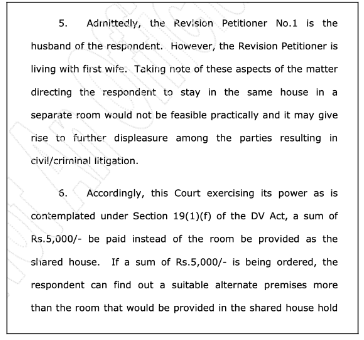
Jammu & Kashmir HC comes to the aid of a BPL women who was duped of employment by government officials in connivance with Sarpanch.
In the case Rajana Devi vs. State of J&K & Ors, a petition was filed in Jammu & Kashmir & Ladakh (J&K&L) High Court, where-in the petitioner challenged the appointment of one of the respondents as an Anganwadi worker at the cost of the petitioner’s entitlement.
As per the case details, applications were sought for the position of Anganwadi worker, for the Anganwadi Centre. There were three applications, of which one was disqualified based on residential status. In the assessment, the petitioner secured higher points than another applicant (Respondent 6), and hence, she was the number one candidate entitled to engagement.
The petitioner was taken aback when the order of appointment was issued to the other candidate. The petitioner filed a writ petition challenging the appointment prior to which the petitioner sought information and documents by filing an RTI application.
The petitioner belongs to Below Poverty Line (BPL) status and is a middle pass in her education. Her husband has a 50% permanent disability in his right-hand.
The Selection committee panel that issued the appointment was a 3-member committee, consisting of the Child Development Project Officer, a District Social Welfare Officer, and a Programme Officer of the ICDS project.
The basis of the appointment was an alleged affidavit submitted by the petitioner to the selection committee, in which the petitioner stated that she would not be working as an Anganwadi worker.
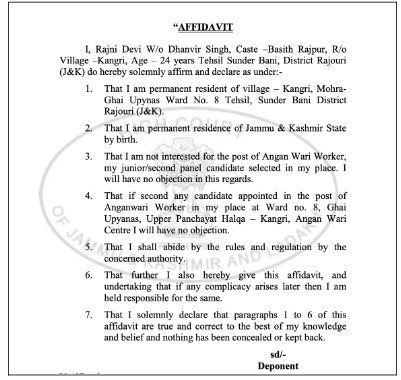
The allegation by the petitioner was that the selection panel was in connivance with the sarpanch of the village, whose daughter-in-law was appointed as the Anganwadi worker.
In their response, the respondents i.e., the woman appointed as Anganwadi workers as well as the government officials laid emphasis on the alleged affidavit to be the basis for appointment.
The single judge bench of Justice Rahul Bharti, took cognizance of the affidavit and based on the facts of the case, observed that there was a mala fide intent in getting the affidavit from the petitioner and she was duped, even though she has signed it.
One of the facts was that the affidavit was dated 24 November 2011, and the selection panel was prepared on 06 February 2012. There was no chance that the petitioner would have known about her position as the number one to get the appointment, as of the date of the affidavit that was alleged to be submitted by her and accepted by the government officers.
The judge further highlighted that the information which was known to the selection panel was known to the Sarpanch, who has initiated the ploy to get the petitioner out of consideration for selection.
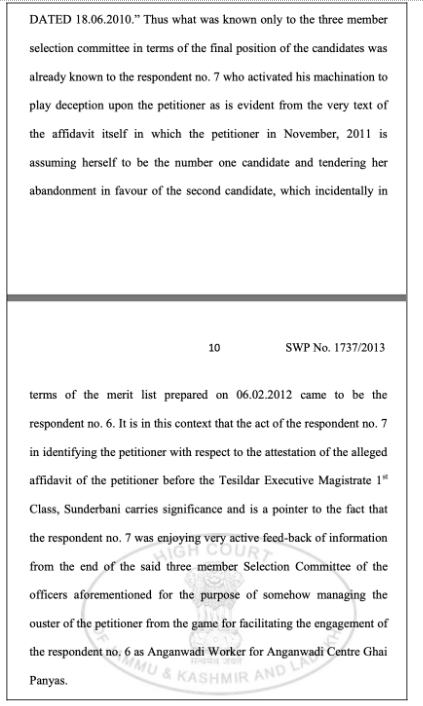
The Court observed that it cannot lend any legitimacy to this case of fraud. It expressed its displeasure at the connivance of the members of the Selection Committee and the Sarpanch, and that it was corrupt in nature with an intent to deprive the petitioner of her merit-based entitlement.
It stated that the appointment of the other person is null and void and is set aside. It further directed Anti-Corruption Bureau to undertake an enquiry into this matter. It also directed necessary actions to be taken for the appointment of the petitioner.
Madras HC: Hindu Succession Act will not come in way of inheritance by Tribal woman.
Hearing an appeal challenging the orders of the Trial Court, the Madras High Court came to the support of tribal women in their struggle for equal succession rights.
The trial court has earlier invoked the provisions of the Hindu Succession Act and held that the tribal women are also entitled to an equal share in their family property on par with other male coparceners. The High court was also of this view and noted that the Hindu Succession Law does not exclude tribal women from its operation but only intends to positively include the customs.
As per the appeal in the case Saravanan and another vs. Semmayee and others, it was contended that Section 2(2) of the Hindu Succession Act clearly excludes tribal women from the application of the Hindu Succession Act and hence, the trial court has erroneously applied the law.
The respondents of the case argued that since the appellants failed to establish the custom and practice prevailing in the community to which they belong, they would be governed by the Hindu Succession Act. Hence, the trial court was right in relying upon this law.
The respondents also contended that the tribal women cannot be denied an equal share on par with other female Hindus in the state, as this goes against the non-discrimination enshrined in the Constitution.
The court examined the customs and practices that prevailed in the community, to apply the exclusion clause contained in Section 2(2). The provisions of the Act will come into effect if there is no custom or practice.
It noted that the legislation was not intended for any inequality but only to protect the customs and practices prevailing in the community.
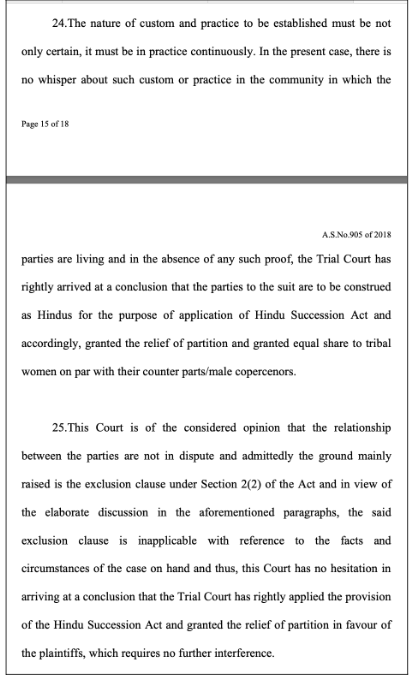
Bombay HC: Finds no prima facie “deceptive similarity” in logos and grants interim relief for certain products
In the case Pidilite Industries vs. Chiripal Industries Ltd, the Bombay High Court held that there is no prima facie deceptive similarity between Fevicol manufacturer Pidilite Industries logo and Chiripal Industries’ logo.
The logo of Pidilite industries has two elephants against the backdrop of a sunset, while Chirpal Industries’ logo contains the word “Tikawoo” with a Rhino against the backdrop of the Sun.
In this case, the plaintiff i.e., Pidilite Industries claimed infringement and passing off with respect to its registered trademarks HEATX, LW+, LW and DR. FIXIT with an image of a man wearing a yellow constriction helmet. Infringement was also regarding the copyright over the aforementioned logo of two elephants with a backdrop of the Sun.
Pidilite claimed that the defendant infringed its trademark and copyrights with the image of a man wearing a construction helmet and also the logo having a rhino with a backdrop of the Sun. It also claimed that the defendant is using the mark HEAT-TIK for an identical product of heat resistant adhesive.
The court noted that while comparing rival marks, the overall impression must be appreciated rather than going into each feature of the marks to ascertain any similarity of difference.
It stated that there is no prima facie case to show deceptive similarity between the words Dr. Fixit and Mr. Engineer. It noted the same in regard to Pidilite related logo of a man wearing a yellow construction helmet and the respondent’s image of a man wearing a construction helmet.
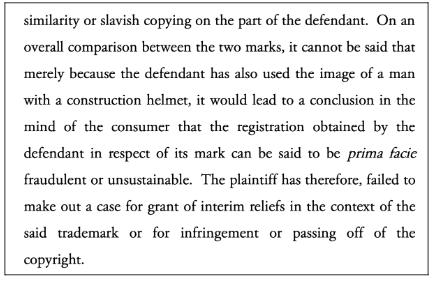
With respect to other products, it held that there is a deceptive similarity between the terms of the plaintiff’s mark LW and LW+ against the defendant’s mark LWP+. It rejected the defendant’s contention that Pidilite cannot claim monopoly over LW and LW+, as it’s short for ‘Liquid Waterproofing”. It also noted that there is a scope of confusion between the plaintiff’s HEATX and Defendant’s HEAT-TIK. The overall colour scheme used in this mark further increases the confusion.

With respect to the logo of Pidilite and that of Chiripal, the court noted that merely since Sun is shown in the background, it is not a case of deceptive similarity as there is a difference between Pidilite’s logo having two elephants and that of Chiripal having a Rhino.
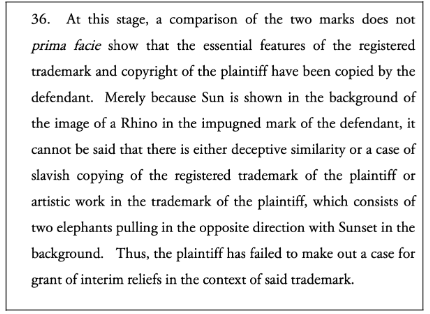
Supreme Court: Compulsory retirement order can be set aside if it’s found to be punitive & was passed to circumvent disciplinary proceedings.
Supreme Court bench comprising of Justice A.S. Bopanna and Justice Hima Kohli, set aside an order passed by the Central Board of Direct Taxes (CBDT), communicating the order of the President, to compulsorily retire a Gazetted Officer who was being considered for appointment as a Member of Income Tax Appellate Tribunal.
The bench noted that the order of compulsory retirement is unsustainable in law, and it was punitive in nature, passed to circumvent the pending disciplinary proceedings against the concerned Officer.
As per the details of the case, the appellant who was a Permanent Commissioned Officer in the Indian Army (inducted in 1980) was released from the service after suffering a physical disability. He appeared for the Civil Services Examination in 1989 and was appointed to Indian Revenue Service.
He was promoted to the rank of Commissioner, in the Department of Income Tax in 2012. In 2014, he was empanelled for appointment as a Member of the Income Tax Appellate Tribunal (ITAT). His name was forwarded to Appointments Committee in 2015 and was empanelled in 2016 to be appointed as Joint Secretary to the Government of India.
He has an adverse Intelligence Bureau report, which he challenged before Central Administrative Tribunal. The CAT directed the Union government to resubmit that report to the selection committee. The Union government filed an appeal in Allahabad High court against the direction of CAT, which was duly dismissed.
A vigilance inspection was carried out on the vigilance clearance initially granted by the Union government was later withdrawn. The Union government also put his name in the “Agreed List”, which lists out Gazetted Officers of suspect integrity.
The appellant filed an application before CAT challenging the inclusion of his name in the Suspect List, for which an interim order was granted in his favour. The tribunal directed his name to be forwarded to be appointed to ITAT.
The Union government did not comply and challenged the order in High Court and the tribunal. Disciplinary proceedings were issued against him by the Union Government, and he was compulsorily retired in 2019. The union government’s plea not to interfere in this order was challenged before CAT and was dismissed, and so was the case with the petition filed in High Court.
Looking into the details of the case, Supreme Court noted that the Government has the absolute right to retire an employee, if in the public interest. A notice of at least three months is required to be provided to the outgoing employee and the provision of compulsory retirement can be invoked only if the officer has attained 50 years of age. It also noted the limitation of the judicial review with respect to such matters.
In this case, the court noted the earlier track record over a decade, which has been outstanding. There were also no adverse records, and no complaints regarding his character, efficiency, and integrity.
However, the Union Government argued that there were around 9 complaints against the appellant in the Vigilance directorate. The Supreme Court took cognizance of the same but noted that the service record does not reflect the same. It stated that it did not find anything significant on record which would demonstrate a need for him to be compulsorily retired.
In this context, the court considered the allegations raised by the appellant regarding institutional bias and malice against the Union government and in particular Chairman, CBDT.
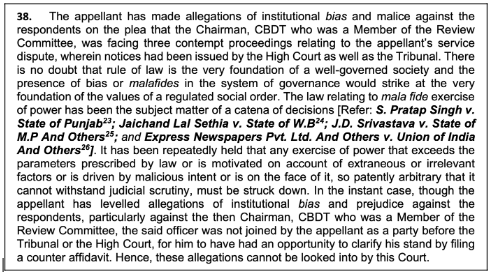
It noted that the order is punitive in nature and was passed to circumvent the pending disciplinary proceedings against the concerned Officer, to ensure his immediate removal.
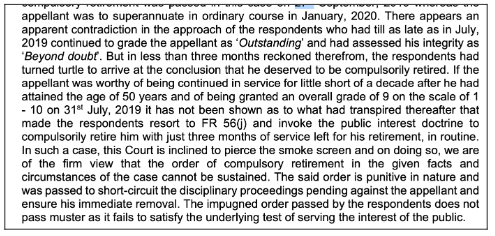
Featured Image: Review of Court Judgments


